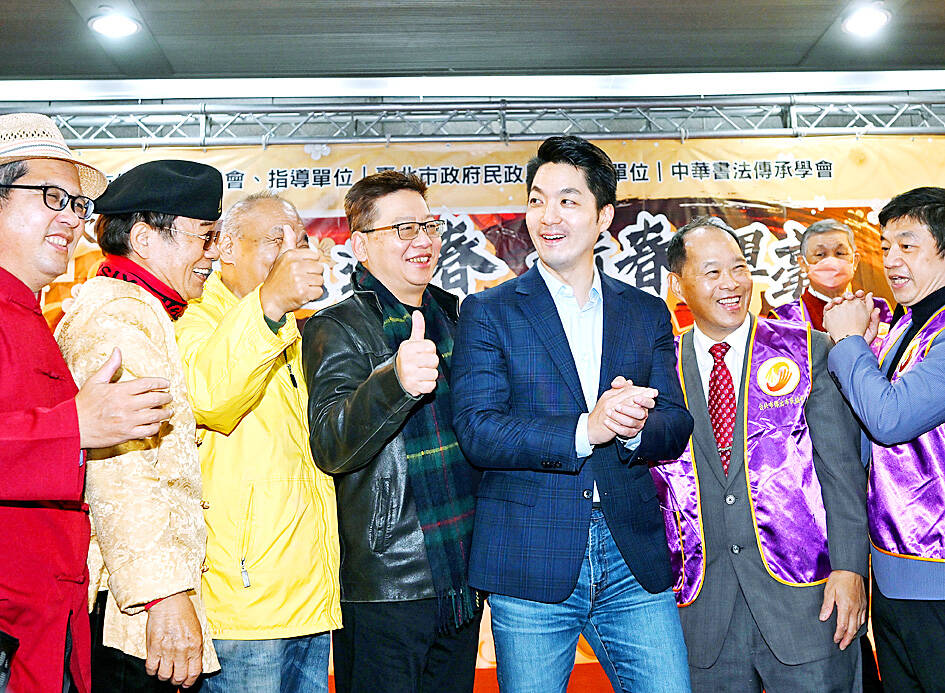The Taipei City Government is making a comprehensive evaluation of its finances, Taipei Mayor Chiang Wan-an (蔣萬安) said yesterday after a city councilor wrote online that the city had surplus tax revenue from the past eight years.
Chiang said that any extra money would probably be used to push forward the city’s policies.
Taipei City Councilor Miao Po-ya (苗博雅) of the Social Democratic Party on Friday wrote on Facebook that the city government under former Taipei mayor Ko Wen-je (柯文哲) had accrued surplus revenue of about NT$21 billion (US$683.77 million) from local taxes.

Photo: CNA
Miao linked the financial issue in Taipei to a similar situation the central government faces.
Legislators from across party lines have called on the central government to “return surplus tax revenue to the public” and Premier Su Tseng-chang (蘇貞昌) on Wednesday announced a plan to give each Taiwanese a one-off cash payment of NT$6,000 from surplus tax revenue raised last year.
Miao asked if the city government would also give each city resident a one-off cash payment of NT$8,500, as Ko’s Taiwan People’s Party and Chiang’s Chinese Nationalist Party (KMT) have insisted that the nationwide surplus should be “returned to the people.”
The city government is making an inventory of its tax revenue and would explain the issue clearly when the evaluation is completed, Chiang said on the sidelines of an event to distribute spring couplets.
However, the revenue should be used to implement important policies, such as reducing the financial burden for young city residents or pushing forward social welfare policies, he said.
He did not elaborate when asked if the city would consider cash payments similar to what the central government is planning.
Turning to other matters, Chiang said that as the Dihua Street Lunar New Year market in Taipei’s Datong District (大同) would have stalls offering food samples again this year, the city government advises people to avoid eating while walking and to maintain social distance to help prevent the spread of COVID-19.

DEFENSE: The National Security Bureau promised to expand communication and intelligence cooperation with global partners and enhance its strategic analytical skills China has not only increased military exercises and “gray zone” tactics against Taiwan this year, but also continues to recruit military personnel for espionage, the National Security Bureau (NSB) said yesterday in a report to the Legislative Yuan. The bureau submitted the report ahead of NSB Director-General Tsai Ming-yen’s (蔡明彥) appearance before the Foreign and National Defense Committee today. Last year, the Chinese People’s Liberation Army (PLA) conducted “Joint Sword-2024A and B” military exercises targeting Taiwan and carried out 40 combat readiness patrols, the bureau said. In addition, Chinese military aircraft entered Taiwan’s airspace 3,070 times last year, up about

The Overseas Community Affairs Council (OCAC) yesterday announced a fundraising campaign to support survivors of the magnitude 7.7 earthquake that struck Myanmar on March 28, with two prayer events scheduled in Taipei and Taichung later this week. “While initial rescue operations have concluded [in Myanmar], many survivors are now facing increasingly difficult living conditions,” OCAC Minister Hsu Chia-ching (徐佳青) told a news conference in Taipei. The fundraising campaign, which runs through May 31, is focused on supporting the reconstruction of damaged overseas compatriot schools, assisting students from Myanmar in Taiwan, and providing essential items, such as drinking water, food and medical supplies,

STRICTER ENFORCEMENT: Taipei authorities warned against drunk cycling after a sharp rise in riding under the influence, urging greater public awareness of its illegality Taipei authorities have issued a public warning urging people not to ride bicycles after consuming alcohol, following a sharp rise in riding under the influence (DUI) cases involving bicycles. Five hundred and seven people were charged with DUI last year while riding YouBikes, personal bicycles, or other self-propelled two-wheelers — a fourfold increase from the previous year, data released by the Taipei Police Department’s Traffic Division showed. Of these, 33 cases were considered severe enough to be prosecuted under “offenses against public safety,” the data showed. Under the Road Traffic Management and Penalty Act (道路交通管理處罰條例), bicycles — including YouBikes and other

A magnitude 4.3 earthquake struck eastern Taiwan's Hualien County at 8:31am today, according to the Central Weather Administration (CWA). The epicenter of the temblor was located in Hualien County, about 70.3 kilometers south southwest of Hualien County Hall, at a depth of 23.2km, according to the administration. There were no immediate reports of damage resulting from the quake. The earthquake's intensity, which gauges the actual effect of a temblor, was highest in Taitung County, where it measured 3 on Taiwan's 7-tier intensity scale. The quake also measured an intensity of 2 in Hualien and Nantou counties, the CWA said.